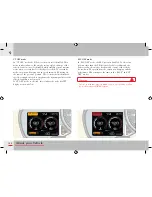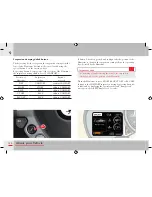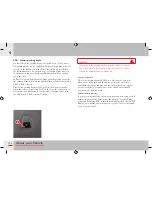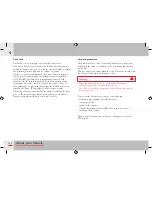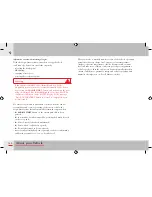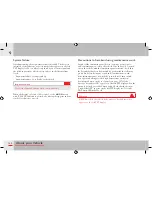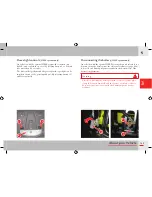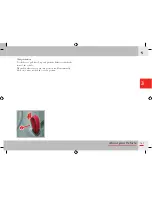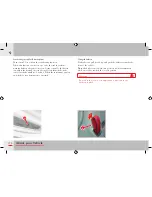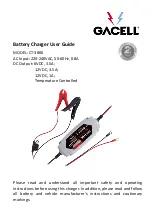
159
About your Vehicle
3
Conditions required to activate automatic engine stop
To activate the automatic engine stop while driving:
- the Stop&Start system must be activated by pressing the button
on the roof panel (LED on);
- the driver’s seat belt must be fastened.
For safety reasons and to guarantee driving comfort and correct
operating of the entire vehicle, automatic engine switching-off is
deactivated when:
- the accelerator pedal is depressed;
- a potentially dangerous situation is identified (steep road, vehicle
stationary with wheels turned, i.e. when turning at a crossroads or
on a roundabout);
- the system recognises vehicle motion in slow traffic or a parking
manoeuvre (checking reverse gear engagement, time elapsed since
last stop, driving speed);
- maximum air conditioning and heating system performance is
requested (“low”, “max defrost” or “rear screen demisting”);
- external temperatures are very low or very high;
- the gearbox is in the “
N
” position;
- the Front Lift system has been activated;
- the DCT gearbox Park Lock has been manually released;
- a failure interferes with proper system operating.
The system also constantly monitors some of the vehicle operating
parameters (battery charge level, engine coolant temperature,
catalytic converter temperature, clutch oil temperature, vacuum
level in brake servo, climate comfort in passenger compartment) so
that engine switching off can be deactivated in certain conditions to
guarantee safety and vehicle operating and minimise the impact on
on-board climate comfort.
Important note
After the first cold start, the Stop&Start system may take a few
minutes before it is ready. This time period allows some of the
engine parameters (catalytic converter temperature, for example)
to reach the values required to reduce emissions.
Important note
If the engine continues to run when the vehicle is stationary
and the brake pedal is pressed, even if the Stop&Start system
appears to be activated, it means that the system has disabled
automatic switching off of the engine. When this happens, no
specific signal is displayed on the instrument panel: this is to be
considered normal.
Summary of Contents for 488
Page 1: ......
Page 3: ......
Page 13: ...GENERAL 1 ...
Page 16: ...16 General ...
Page 17: ...17 General 1 ...
Page 24: ...24 General Identification and homologation plates and labels A B E F G L M O P N H C Q R ...
Page 26: ...26 General A Low beam homologation B ECE homologation C Vehicle identification ...
Page 29: ...29 General 1 P TPMS present warning Q Chassis number R Original paintwork ...
Page 41: ...SAFETY 2 ...
Page 71: ...ABOUT YOUR VEHICLE 3 ...
Page 82: ...82 About your Vehicle Instruments and gauges 6 5 1 5 3 7 2 5 4 5 ...
Page 199: ...199 About your Vehicle 3 ...
Page 201: ...ADVICE FOR EMERGENCY SITUATIONS 4 ...
Page 237: ...CARE OF THE VEHICLE 5 ...
Page 254: ...Glossary 257 ...
Page 255: ...GLOSSARY 6 ...
Page 256: ......
Page 260: ...Table of Contents 262 ...
Page 261: ...TABLE OF CONTENTS 7 ...




